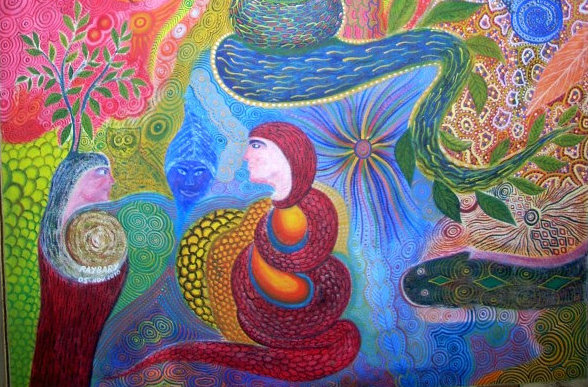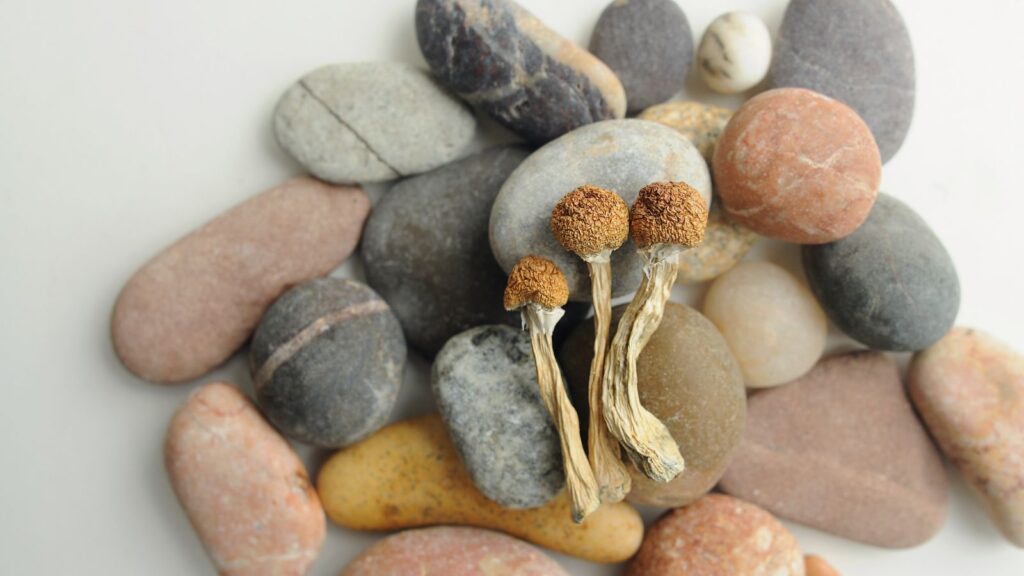Tips From the Women’s Visionary Congress (WVC)
A growing number of people around the world are taking part in ceremonies where participants enter non-ordinary states of consciousness. Members of my community have benefited from these experiences. Many of us are interested in expanded forms of awareness that promote healing and self-knowledge. We have worked with wise teachers, counselors, and shamanic practitioners who use psychoactive substances with great integrity and make them available to those who attend their ceremonies. I have been fortunate to know many women who are interested in these ceremonies – and other forms of expanded consciousness. In 2007, a group of women in the San Francisco Bay Area began gathering to talk about the potential for personal growth that can arise from such experiences – and the challenges of these investigations. Together with elder women from this community, I helped form a non-profit organization called the Women’s Visionary Congress (WVC) http://visionarycongress.org to host events where people of all genders can hear presentations from female healers, researchers, activists and artists who explore altered states.
When the WVC first began organizing gatherings, ceremonies that include psychoactive substances often took place in secret. Since that time, these types of rituals, especially those involving Ayahuasca, have become much more accessible and widely publicized. While these experiences can offer profound spiritual revelations, members of our community have become increasingly concerned about reports of ceremonial leaders sexually assaulting female participants. We began discussing this topic during WVC gatherings several years ago and heard first hand accounts from women who had been violated in this way. Since then, the number of people contacting us to report these types of violations has increased. Men have also witnessed these incidents and expressed deep concern for the safety of their female companions. We have no way of knowing whether there is actually an increase in these types of assaults due to the growing number of ceremonies – or whether those affected simply feel more empowered to tell us about them. Either way, it troubles us deeply.
Unfortunately, the sexual violation of women by people who present themselves as spiritual leaders is an old problem. Like medical practitioners, ceremonial leaders have a moral duty not to abuse their power over those they care for. There is no firm data about how often these events occur and many victims are reluctant to publicly discuss their experiences. The WVC received a message recently about a woman who was assaulted by a male shaman after participating in an Ayahuasca ceremony. The woman was afraid that if she spoke out, the man would place a curse on her. She feared reporting the incident to authorities because she was under the influence of a substance that is illegal in her home country.
There are laws against sexual assault in countries where ceremonies take place and traditional communities have their own forms of accountability. Additional regulations, standards, or controls imposed on these ceremonies are sometimes turned against participants and the producers of these substances. Yet everyone has a right to be treated with respect while participating in these ceremonies. We support efforts to hold ceremonial leaders accountable for their actions. And we strongly recommend that women – and all participants – take proactive measures to stay safe before, during and after these experiences. Knowledge is power. Below is a list of twenty safety tips created by the WVC to help people prepare for these ceremonies and reduce the potential for unsafe encounters. Some of these suggestions are also good to keep in mind for general self-care to receive the maximum benefit from these experiences.
- Work With Women – Concerns about the well-being of female participants is expanding the number of ceremonies led by experienced female healers. Participants of all genders tell us that they welcome working with woman ceremonial leaders – or attending gatherings where there are both women and men leading the ritual. Many people find this a more comfortable and balanced way to feel supported in ceremony. Support your favorite female shamans.
- Conduct Due Diligence – Check out the reputation of the shaman or healer you are considering being in ceremony with. If possible, talk to people who have worked with this person and their assistants. Search online for reviews by past participants. Inquire about the ceremonial leader’s background and who they apprenticed with. Determining their lineage, and if they trained with someone who is known to violate women, provides insight into their integrity. Consider that those who work with people who abuse participants are themselves culpable. If you cannot confirm the background of your intended ceremonial leader, wait for another opportunity to be in ceremony with someone whose ethics you can verify.
- Consider the Substance – Carefully consider the quality of the substance dispensed during the ceremony. Talk to others who have ingested preparations made by the same person or group. Try to determine which substance(s) will be used and at what dosage. If you have never ingested this material, research its effects, possible benefits and drawbacks. Consider ingesting at the lowest dosage offered. The Erowid library erowid.org is an excellent resource for learning more about psychoactive substances and reading first hand accounts from those who use them.
- Check Out the Physical Space– Determine where the ceremony will be held and if the location is considered safe and comfortable by past participants. Contact others who have attended ceremonies in that location. Request a description of the space and how it will be used. If you are traveling to participate in a ceremony, investigate the safety of your lodgings. This is especially important if you plan to attend a ceremony in a country other than your own. Determine if others feel safe there. Read online reviews of your intended accommodations. Request an escort if you feel unsafe en route to your lodging.
- Find Local Ceremonies – Explore the possibility of participating in ceremonies that take place in your own community or a nearby location. Ceremonial retreat centers outside the U.S. market themselves vigorously. But thanks to the international expansion of these rituals, you do not need to travel to experience their benefits. Consider the economic self-interest of those who try to convince you otherwise. A growing number of ceremonial leaders hold rituals in the U.S., Canada and Europe. These practitioners can be held accountable under laws in these jurisdictions. Determine if there is a local wisdom keeper you feel comfortable working with.
- Journey With Friends –Attend the ceremony with a trusted friend or group of people you know. While they themselves may not be able to watch over you while participating in the ceremony, having friends with you before, during and after the ritual can provide support and a familiar frame of reference. The presence of friends may also discourage predators from targeting you.
- Create A Plan – Develop a safety plan with friends who are participating in the ceremony and those who are not taking part. Conduct check-ins with these people before and after the event. Consider asking a non-participant for a ride home after the ritual. If you are traveling for the ceremony, determine what types of support services exist in that location.
- Identify Accountability Mechanisms – Identify forms of accountability for the shaman or healer you intend to work with. If that person disrespects or harms you in some way, what mechanisms exist to help ensure they are held accountable? Is that person part of a larger community who can hold them to a standard of care? What would happen if you attempted to file sexual assault charges in the country where the ceremony is taking place?
- Cultivate Boundaries – Make a habit of setting good physical and psychic boundaries. Focus on this skill in the weeks leading up to the ceremony. Learn how to set a protective energetic shield around yourself. Understand that such measures can be modulated to permit exposure to beneficial energies.
- Set Intentions – Come to the ceremony with a clear intention. Decide what you want out of the experience. Take stock of your present strengths and weaknesses. Prepare a question or set of queries that a shift in consciousness may help you address. If you find yourself in the presence of the Divine, it’s helpful to be prepared.
- Strengthen Yourself – Cultivate your overall health and well being before the ceremony. Arrive at the gathering rested and fully present. Develop a personal ritual to ground yourself physically and mentally. Understand that you have it within your power to defend yourself in the spirit world. If circumstances in your life have placed you in a particularly uncomfortable state of mind, try to address these issues prior to the gathering.
- Ask For Help – Cultivate a spiritual practice that gives you access to spirit allies, ancestors or guardians. Practice asking these beings for assistance. Contact them during the ceremony and maintain an open channel with your protectors.
- Focus Inward – During the ceremony, be wary of physical contact with other participants. Do not attempt to intervene or assist others taking part. Allow the leaders of the ceremony to take this role. If other participants are impacting your experience, alert the facilitators.
- Evaluate Touch – If a shaman, healer, or apprentice touches you during the ceremony, be aware of where they are placing their hands and if the encounter feels sexual. If you are uncomfortable with this touch, express your displeasure and if possible, move away. Ask for assistance from others leading the ceremony. Refuse to be victimized.
- Examine Consensual Sex – Consensual sexual encounters between ceremonial leaders and participants do occur. These experiences may make the participant feel special, but such relationships imply an imbalance of power that has the potential to be coercive and potentially abusive. Consider that the professional ethical standard for licensed therapists in the U.S. is a complete ban on intimate relationships with former clients for two years after the conclusion of their therapeutic work together. Reflect deeply on the wisdom of this standard.
- Take Time To Integrate – After the ceremony, take special care of your physical and mental state. Rest, hydrate, and eat nourishing food. Be aware that the process of integrating the experience can take time. Be patient with yourself and if possible, avoid especially challenging encounters in the days following the event.
- Check In After the Ceremony – Check in with the healer, their assistants and/or the facilitators at the conclusion of the ceremony. Express your impressions of the experience. If you have misgivings that you wish to address privately, wait until after the period of group sharing has concluded before raising concerns. Considering having a neutral observer present during this conversation.
- Protect Yourself – Remain protective of your personal space after the ceremony when you may be in a vulnerable state. Those who truly care for your well-being will respect your right to nurture yourself in this way. Be alert for sexual or romantic overtures and how they might impact you at this time. Wait a few weeks before getting involved with anyone you are not already going out with before the ceremony. Allow time for integration and for the immediate effects of the ceremonial substance to wear off so that you can apply your best judgment.
- Honor Gradual Emotions – Determine how you can contact the leader or facilitators of the ceremony in the days, and weeks that follow. If you feel that you have concerns or questions after the passage of time, follow up and express yourself. Take steps not to let feelings encountered during or after the ceremony get bottled up or unaddressed. Seek a well-trained therapist to support your process of integrating the experience if that feels right to you.
- Offer A Review – Consider writing a review of your experience or making your thoughts known to others in an appropriate venue that can benefit future participants. Both positive and negative critiques of the experience may be helpful to others. Acknowledge and give thanks to shamans and ceremonial leaders whose actions reflect the highest degree of integrity and ethics. Honor the wisdom you receive in ceremony by being a careful and discerning psychonaut.
You can hear an interview with Annie about these Safety Tips conducted by Alan Steinfeld for the New Realities talk radio show http://bbsradio.com/podcast/new-realities-november-24-2015. A version of these Safety Tips are also posted on the WVC website at http://visionarycongress.org/20-safety-tips-for-participating-in-ceremonies-that-use-psychoactive-substances/. If you would like to share your safety suggestions, please add your comments to this story or contact the WVC at info@visionarycongress.org.
Image by Amazing Amazon Adventures, courtesy of Creative Commons license.











